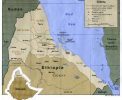To assist water supply, sanitation and hygiene (WASH), nutrition and prevention of acute watery diarrhoea in drought affected Somali Region of Ethiopia; the Japanese government has provided $2 million.
The grant is given to the United Nations Childrens’ Fund (UNICEF), which is working in the region helping the children affected by the drought. The WASH sector will be taking the lion’s share with US$1,500,000 and the rest US$500,000 will be utilized by nutrition programme within an implementation period of six months.
This assistance is provided as a swift response to the joint call for support by Deputy Prime Minister Mr Demeke Mekonnen and United Nations Secretary-General Mr Antonio Guterres at UNECA on 29 January 2017 on the occasion of the High Level Forum on the humanitarian situation in Ethiopia.
The funding from the Japan Government aims to improve access to safe and reliable water to 115,000 women, men, boys and girls through drilling of new boreholes, rehabilitating non-functional water points and providing non-food items for distribution.
In addition, 9,000 children with severe acute malnutrition will receive adequate treatment and 31,488 mothers and caregivers will be trained on adequate infant and young child feeding practices during emergency.
The funding will also help prevent and control water-borne diseases, particularly the transmission of acute watery diarrhoea among affected and at-risk populations by securing access to safe water.
Ambassador of Japan to Ethiopia, Mr Shinichi Saida said, “We sincerely hope that Japan’s urgent humanitarian assistance for the drought response will reach the most vulnerable people as swiftly as possible and have a quick impact on the affected communities. Japan appreciates the WASH sector emergency response and its delivery promoted by Ministry of Water, Irrigation and Electricity in Ethiopia and UNICEF Ethiopia.”
“Children are extremely vulnerable in emergencies, often living in unhealthy and unsafe conditions and at high risk of contracting diseases,” said Ms Gillian Mellsop, UNICEF Representative to Ethiopia. “This contribution is a tangible demonstration of Japan’s commitment to safeguard children’s future and enhance resilience building of communities affected by the recurrent drought.”
Adding to an already dire situation, during the second half of 2016, a strong negative impact of Indian Ocean Dipole (IOD) led to below-average rainfall in different parts of Ethiopia including the Somali region. As a result, the water level declined significantly with seasonal rivers, springs and ponds drying up earlier than normal and increasing frequency of non-functionality of water supply schemes due to over utilization.
UNICEF is currently involved in operations across all the drought affected regions and contributes to the ongoing drought response effort through water trucking, rehabilitation of non-functional water supply schemes, building water storage capacity at critical and good yielding boreholes, provision of therapeutic food supplies, screening of children and pregnant and lactating women for malnutrition and monitoring for the provision of quality nutrition services.
UNICEF’s drought response activities are guided by its Core Commitments for Children in Humanitarian Action, which prioritize timely response in key lifesaving sectors, namely nutrition, health, water, sanitation, and hygiene.

